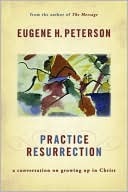More on this book
Community
Kindle Notes & Highlights
Maturity is not a patchwork affair assembled out of bits and pieces of disciplines and devotions, doctrines and causes. It is all the operations of the Trinity in the practice of resurrection.
Those forty days grounded Jesus' resurrection as a life to be lived on streets, in homes, with families and neighbors - a life they, his followers, will live. And not as a private "spiritual" experience, but historically in the company of all of Jesus' followers in workplace and politics, in the carnage of war and the quietness of worship.
Ascension is the opening scene that establishes the context for everything that follows: Jesus installed in a position of absolute rule - Christ our King. All men and
women live under the rule of Jesus. This rule trumps all other thrones and principalities and powers.
Knowing this, with the knowing elaborated and deepened in worship, the church has the necessary room to live robustly under the conditions of resurrection. If we don't know this, the church, its imagination conditioned by death and the devil, will live timidly and cautiously.
Knowing this, with the knowing elaborated and deepened in worship, the church has the necessary room to live robustly under the conditions of resurrection. If we don't know this, the church, its imagination conditioned by death and the devil, will live timidly and cautiously.
Paul places the Ascension focus that Luke established at the threshold of the story of the church's birth and early development by repeating the Ascension imagery, "he ascended on high," as his orienting text for lives formed into a mature resurrection life: the resurrected Jesus rules church and world and every last one
...more
Paul wants us to grow up to "the measure of the full stature of Christ" (Eph. 4:13). A primary condition for developing into maturity is that we take up responsibilities commensurate with our strength and understanding as we grow up and "no longer be children" (4:14).
The ascended Jesus, Jesus at the right hand of the Father, Christ the King, launched his rule by giving gifts, gifts that turn out to be ways in which we participate in his kingly, gospel rule.
We understand gift language well enough. We begin as gift. We don't make ourselves. We don't birth ourselves. We find our fundamental identity as a gift. And then, immediately, we are given gifts: gifts of love and food and clothing and s...
This highlight has been truncated due to consecutive passage length restrictions.
These are not gifts to be placed on a mantle like a vase of flowers. These are not gifts to be used for our convenience like, say, a cell phone. These are not gifts to divert or entertain us, like a gift of tickets to the symphony. These are not gifts of appreciation like an anniversary ruby necklace or a retirement Rolex. These are gifts that equip us to work alongside of and in company with Jesus - "the work of ministry, for building up the body of Christ" (Eph. 4:12). We are being invited into a working relationship in the operations of the Trinity.


